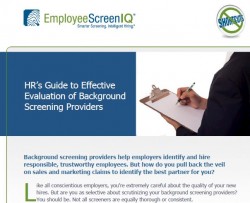 Choosing and monitoring your background screening vendor is as important — and maybe more so even — than the interview you conduct with candidates.
Choosing and monitoring your background screening vendor is as important — and maybe more so even — than the interview you conduct with candidates.
“The worst thing you can do,” says Fred Giles, chair of the National Association of Professional Background Screeners, “is to treat it (your background screening) like a commodity and choose the lowest bidder.”
Once you have made a selection, monitoring the performance and maintaining regular contact is also a must. And, says Giles, “Most significant, most important, is that employers make sure to review the process, their process … Have a clearly defined process for evaluating the results … and an opportunity for the candidate to explain (any negatives).”
In the wake of revelations that the nation’s leading security clearance background firm may have shortcut its procedures, now is a good time for all employers using a background vendor to review how the work is being done.
Says Giles, “It is not unreasonable to ask that the work being done be documented.” Especially for certain types of employment — education, for instance — ask that the names of all contacts be included in the report. It’s also acceptable to have the vendor audit their work; 5 percent of all screens is fairly typical, he says.
If having your vendor audit its own work sounds like having the fox guard the hen house, it sort of is. S0 ask for details about how the audits are done, the team or individuals who do them, and other specifics. You can always hire another firm to conduct an audit, but that adds to the cost and, depending on the potential risk of a mistake, it may not be worth it.
However, the best insurance, says Nick Fishman, an executive with EmployeeScreenIQ, is to be diligent in the selection of a background vendor. “You want to ask questions before you make a decision,” he said.
He echoed Giles’ advice about choosing a vendor:
- Know what it is you want to know. Have a “well defined scope of work,” advises Giles. Detail the types of checks and the depth of the checks. The level of detail you want increases both the information and the confidence you’ll have, but it also increases the cost.
- Make sure your contract includes a provision for the auditing of the reports. Discuss with each vendor their process for ensuring accuracy.
- Look for experienced vendors. Be sure they know the laws of all 50 states, as well as the federal rules governing background checks. This is an area, Giles explains, “that is very fluid.”
 Fishman’s firm has a whitepaper outlining what you need to know about selecting a screening vendor. The five-page paper can be downloaded here.
Fishman’s firm has a whitepaper outlining what you need to know about selecting a screening vendor. The five-page paper can be downloaded here.
Turning a spotlight on background screening are the disclosures in the last two weeks that the federal Office of Personnel Management is investigating its screening vendor, USIS. The firm, which handles a large share of the government’s security clearance checking, is accused of failing to verify the background work it did.
The Washington Post reported OPM’s inspector general, Patrick McFarland, is looking into whether USIS performed the follow-up reviews of initial background checks as it was required to by contract. For a period of at least three years, the newspaper said, USIS claimed it was doing the follow-ups, but may not have in up to 50 percent of the cases.
The company declined to comment other than issuing statements saying it had complied with a January 2012 subpoena for its records, and a second saying the investigation is a civil, not a criminal matter, and unrelated to Snowden.
USIS was initially a government agency, created specifically to handle background checks for security clearances. It was privatized two decades ago, and now performs the largest share of security clearance work for the government and its contractors.
Coincidentally, it is owned by Altegrity, which also owns HireRight, another screening company, that handles background checking for private employers. HireRight was fined $2.6 million last August to settle charges by the Federal Trade Commission it failed to verify the accuracy of its criminal background checks, and other complaints. The fine was the second-largest ever paid in connection with a consumer information violation.
While the USIS case involves background checks for security clearances, Giles, chair of the screening vendors group, says all employers need to be conscientious about their background screening program.
The potential exposure to an employer of a faulty background check may not be as severe as those involving security clearances, but the consequences can be significant. Even if the FTC doesn’t get involved, a civil suit by an unjustly rejected candidate can be costly.
More than legal action, says Giles, “We don’t want to be unfair to anyone.” Conversely, hiring someone who wrongly passes a background screen can lead to employee problems and increased turnover.